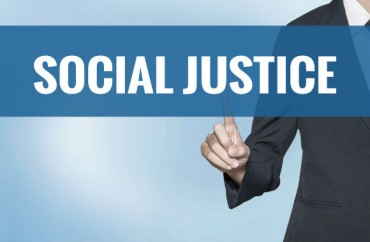“Social justice” is a ridiculously popular buzzword on college campuses; though its meaning is usually unclear and varies from person to person, it is usually taken to refer to progressive politics practiced by zealous liberal activists. And as one lawyer notes, that ideology is “overrunning” his alma mater.
“The latest racket in higher education, evident at my alma mater, the University of Texas at Austin, is the disturbing proliferation of ‘social justice’ as a degree program, a course topic, an academic emphasis, and even as a prerequisite in campus job descriptions,” writes Mark Pulliam, a graduate of its law school, at the James G. Martin Center.
 As Pulliam notes, many people think of social justice as “a harmless synonym for ‘fairness’.” That doesn’t touch on the true nature of the concept, however, which is actually a “colloquial expression with a specific meaning: economic equity (the redistribution of wealth), ‘sustainability’ (a pre-industrial environmental ethos), and the elimination of racial disparities throughout society (all statistical imbalances among racial groups representing, in their view, systemic discrimination and institutional racism).”
As Pulliam notes, many people think of social justice as “a harmless synonym for ‘fairness’.” That doesn’t touch on the true nature of the concept, however, which is actually a “colloquial expression with a specific meaning: economic equity (the redistribution of wealth), ‘sustainability’ (a pre-industrial environmental ethos), and the elimination of racial disparities throughout society (all statistical imbalances among racial groups representing, in their view, systemic discrimination and institutional racism).”
“At the flagship campus of the University of Texas, and many other universities across the country, the concept has become ubiquitous,” Pulliam writes, noting the expansive amount of liberal programs at the school:
For example, UT has a Social Justice Institute, a “central component” of the UT Community Engagement Center within the 94-person Department of Diversity and Community Engagement, headed by Eric Tang, a former community organizer.
The Institute hosts monthly programs (the Social Justice Conversation Series) on selected readings related to social justice and diversity. Topics have included “ableism, sexism, religious oppression, ageism, adultism, heterosexism, transgender oppression, racism and classism.” For each session, cohort leaders “help the conversation flow from a social justice perspective.” Sample discussion questions included, “What are some examples of how people and/or under-represented groups are invisible in oppressive systems? How might your own identities and or/privilege [sic] be informing how you view or interpret this article?”
The Institute’s website maintains a “social justice directory” of faculty members “whose current research and teaching priorities intersect with social justice concerns, activist scholarship and/or community collaborations.” The Institute also features profiles of “activist-scholars of the month” from various UT departments, such as Karma Chavez from the Department of Mexican American and Latina/o Studies, whose scholarship “is primarily informed by queer of color theory and women of color feminism.”
“Social justice has even worked itself into job descriptions at UT,” Pulliam writes. “For example, applicants for a student affairs administrator position must demonstrate a ‘highly developed understanding of social justice concepts and practices’.”
As well, “UT’s job posting for a healthy masculinities coordinatorposition (responsible for running the widely ridiculed MasculinUT program) described the job as ‘a catalyst and resource for advancing violence prevention efforts on UT System campuses that will include a focus on gender equity and social justice,’ and called for candidates with a ‘demonstrated commitment to diversity, social justice, innovation and collaboration’.”
IMAGE: PhuShutter / Shutterstock.com
Like The College Fix on Facebook / Follow us on Twitter




Add to the Discussion